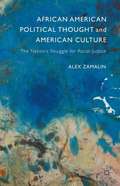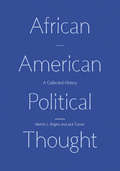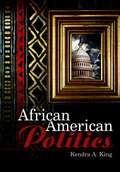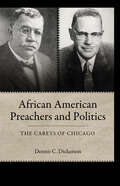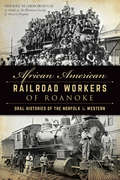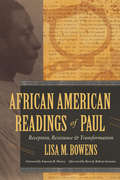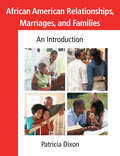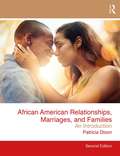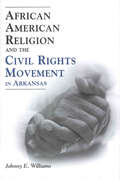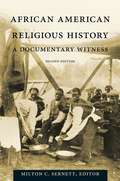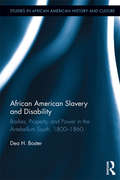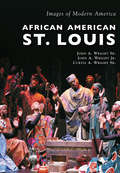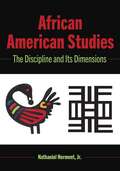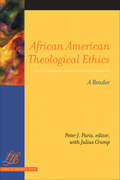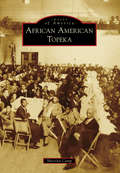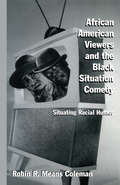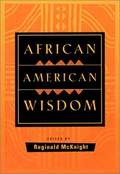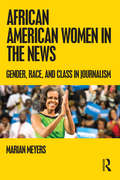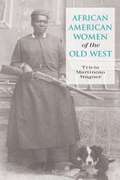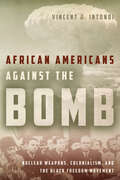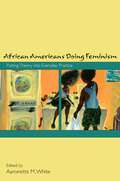- Table View
- List View
African American Political Thought and American Culture: The Nation's Struggle For Racial Justice
by Alex ZamalinThis book demonstrates how certain African American writers radically re-envisioned core American ideals in order to make them serviceable for racial justice. Each writer's unprecedented reconstruction of key American values has the potential to energize American citizenship today.
African American Political Thought: A Collected History
by Jack Turner Melvin L. RogersAfrican American Political Thought offers an unprecedented philosophical history of thinkers from the African American community and African diaspora who have addressed the central issues of political life: democracy, race, violence, liberation, solidarity, and mass political action. Melvin L. Rogers and Jack Turner have brought together leading scholars to reflect on individual intellectuals from the past four centuries, developing their list with an expansive approach to political expression. The collected essays consider such figures as Martin Delany, Ida B. Wells, W. E. B. Du Bois, James Baldwin, Toni Morrison, and Audre Lorde, whose works are addressed by scholars such as Farah Jasmin Griffin, Robert Gooding-Williams, Michael Dawson, Nick Bromell, Neil Roberts, and Lawrie Balfour. While African American political thought is inextricable from the historical movement of American political thought, this volume stresses the individuality of Black thinkers, the transnational and diasporic consciousness, and how individual speakers and writers draw on various traditions simultaneously to broaden our conception of African American political ideas. This landmark volume gives us the opportunity to tap into the myriad and nuanced political theories central to Black life. In doing so, African American Political Thought: A Collected History transforms how we understand the past and future of political thinking in the West.
African American Politics (Us Minority Politics #6)
by Kendra KingAfrican-American Politics is a cutting-edge introduction to the political successes, failures, and persistent challenges of African-American political participation in the United States. Exploring both historic and present day political phenomena, the book draws on a wide range of sources, including U.S. Census data, Gallup Polls, landmark court opinions, speeches and first-hand interviews to provide the reader with a comprehensive and up-to-the-minute analysis of what often appear to be "irreconcilable differences" between the American political system and one of its most historically subjugated constituency groups.
African American Preachers and Politics: The Careys of Chicago (Margaret Walker Alexander Series in African American Studies)
by Dennis C. DickersonDuring most of the twentieth century, Archibald J. Carey, Sr. (1868–1931) and Archibald J. Carey, Jr. (1908–1981), father and son, exemplified a blend of ministry and politics that many African American religious leaders pursued. Their sacred and secular concerns merged in efforts to improve the spiritual and material well-being of their congregations. But as political alliances became necessary, both wrestled with moral consequences and varied outcomes. Both were ministers to Chicago's largest African Methodist Episcopal Church congregations—the senior Carey as a bishop, and the junior Carey as a pastor and an attorney. Bishop Carey associated himself mainly with Chicago mayor William Hale Thompson, a Republican, whom he presented to black voters as an ally. When the mayor appointed Carey to the city's civil service commission, Carey helped in the hiring and promotion of local blacks. But alleged impropriety for selling jobs marred the bishop's tenure. The junior Carey, also a Republican and an alderman, became head of the panel on anti-discrimination in employment for the Eisenhower administration. He aided innumerable black federal employees. Although an influential benefactor of CORE and SCLC, Carey associated with notorious FBI director J. Edgar Hoover and compromised support for Martin Luther King, Jr. Both Careys believed politics offered clergy the best opportunities to empower the black population. Their imperfect alliances and mixed results, however, proved the complexity of combining the realms of spirituality and politics.
African American Railroad Workers of Roanoke: Oral Histories of the Norfolk & Western (American Heritage)
by Historical Society of Western Virginia Sheree ScarboroughRoanoke, Virginia, is one of America's great historic railroad centers. The Norfolk & Western Railway Company, now the Norfolk Southern Corporation, has been in Roanoke for over a century. Since the company has employed many of the city's African Americans, the two histories are intertwined. The lives of Roanoke's black railroad workers span the generations from Jim Crow segregation to the civil rights era to today's diverse corporate workforce. Older generations toiled through labor-intensive jobs such as janitors and track laborers, paving the way for younger African Americans to become engineers, conductors and executives. Join author Sheree Scarborough as she interviews Roanoke's African American railroad workers and chronicles stories that are a powerful testament of personal adversity, struggle and triumph on the rail.
African American Readings of Paul: Reception, Resistance, and Transformation
by Lisa M. BowensThe letters of Paul—especially the verse in Ephesians directing slaves to obey their masters—played an enormous role in promoting slavery and justifying it as a Christian practice. Yet despite this reality African Americans throughout history still utilized Paul extensively in their own work to protest and resist oppression, responding to his theology and teachings in numerous—often starkly divergent and liberative—ways. In the first book of its kind, Lisa Bowens takes a historical, theological, and biblical approach to explore interpretations of Paul within African American communities over the past few centuries. She surveys a wealth of primary sources from the early 1700s to the mid-twentieth century, including sermons, conversion stories, slave petitions, and autobiographies of ex-slaves, many of which introduce readers to previously unknown names in the history of New Testament interpretation. Along with their hermeneutical value, these texts also provide fresh documentation of Black religious life through wide swaths of American history. African American Readings of Paul promises to change the landscape of Pauline studies and fill an important gap in the rising field of reception history.
African American Readings of Paul: Reception, Resistance, and Transformation
by Lisa M. BowensThe letters of Paul—especially the verse in Ephesians directing slaves to obey their masters—played an enormous role in promoting slavery and justifying it as a Christian practice. Yet despite this reality African Americans throughout history still utilized Paul extensively in their own work to protest and resist oppression, responding to his theology and teachings in numerous—often starkly divergent and liberative—ways. In the first book of its kind, Lisa Bowens takes a historical, theological, and biblical approach to explore interpretations of Paul within African American communities over the past few centuries. She surveys a wealth of primary sources from the early 1700s to the mid-twentieth century, including sermons, conversion stories, slave petitions, and autobiographies of ex-slaves, many of which introduce readers to previously unknown names in the history of New Testament interpretation. Along with their hermeneutical value, these texts also provide fresh documentation of Black religious life through wide swaths of American history. African American Readings of Paul promises to change the landscape of Pauline studies and fill an important gap in the rising field of reception history.
African American Relationships, Marriages, and Families
by Patricia DixonAfrican American Relationships, Marriages, and Families is a historically and culturally centered text designed for relationship, marriage and family educators and therapists who work with African American singles and couples. Complete with numerous exercises, the book helps singles and couples increase their self-awareness, partner awareness and respect, and appreciation for difference. It also helps foster effective communication and conflict resolution skills, showing readers how to develop and maintain healthy relationships, marriages, and families. No ground is left uncovered in Dixon's thoughtful and considered analysis.
African American Relationships, Marriages, and Families: An Introduction
by Patricia DixonAfrican American Relationships, Marriages, and Families, Second Edition is a historically and culturally centered research-based text designed for use in undergraduate, graduate, and community-based courses on African American relationships, marriages, and families. Complete with numerous exercises, this volume can be used by current and future helping professionals to guide singles and couples by increasing single and partner-awareness, and respect and appreciation for difference. In addition, singles and couples learn skills for effective communication and conflict resolution and ultimately how to develop and maintain healthy relationships, marriages, and families. This second edition includes updates and revisions to current chapters and also features two new chapters: one on parenting and one on same-gender loving/LGBTQ.
African American Religion and the Civil Rights Movement in Arkansas (Margaret Walker Alexander Series in African American Studies)
by Johnny E. WilliamsWhat role did religion play in sparking the call for civil rights? Was the African American church a motivating force or a calming eddy? The conventional view among scholars of the period is that religion as a source for social activism was marginal, conservative, or pacifying. Not so, argues Johnny E. Williams. Focusing on the state of Arkansas as typical in the role of ecclesiastical activism, his book argues that black religion from the period of slavery through the era of segregation provided theological resources that motivated and sustained preachers and parishioners battling racial oppression. Drawing on interviews, speeches, case studies, literature, sociological surveys, and other sources, Williams persuasively defines the most ardent of civil rights activists in the state as products of church culture. Both religious beliefs and the African American church itself were essential in motivating blacks to act individually and collectively to confront their oppressors in Arkansas and throughout the South. Williams explains how the ideology of the black church roused disparate individuals into a community and how the church established a base for many diverse participants in the civil rights movement. He shows how church life and ecumenical education helped to sustain the protest of people with few resources and little permanent power. Williams argues that the church helped galvanize political action by bringing people together and creating social bonds even when societal conditions made action difficult and often dangerous. The church supplied its members with meanings, beliefs, relationships, and practices that served as resources to create a religious protest message of hope.
African American Religions, 1500–2000
by Sylvester A. JohnsonThis book provides a narrative historical, postcolonial account of African American religions. It examines the intersection of Black religion and colonialism over several centuries to explain the relationship between empire and democratic freedom. Rather than treating freedom and its others (colonialism, slavery and racism) as opposites, Sylvester A. Johnson interprets multiple periods of Black religious history to discern how Atlantic empires (particularly that of the United States) simultaneously enabled the emergence of particular forms of religious experience and freedom movements as well as disturbing patterns of violent domination. Johnson explains theories of matter and spirit that shaped early indigenous religious movements in Africa, Black political religion responding to the American racial state, the creation of Liberia, and FBI repression of Black religious movements in the twentieth century. By combining historical methods with theoretical analysis, Johnson explains the seeming contradictions that have shaped Black religions in the modern era.
African American Religious History: A Documentary Witness
by Milton C. SernettThis widely-heralded collection of remarkable documents offers a view of African American religious history from Africa and early America through Reconstruction to the rise of black nationalism, civil rights, and black theology of today. The documents--many of them rare, out-of-print, or difficult to find--include personal narratives, sermons, letters, protest pamphlets, early denominational histories, journalistic accounts, and theological statements. In this volume Olaudah Equiano describes Ibo religion. Lemuel Haynes gives a black Puritan's farewell. Nat Turner confesses. Jarena Lee becomes a female preacher among the African Methodists. Frederick Douglass discusses Christianity and slavery. Isaac Lane preaches among the freedmen. Nannie Helen Burroughs reports on the work of Baptist women. African Methodist bishops deliberate on the Great Migration. Bishop C. H. Mason tells of the Pentecostal experience. Mahalia Jackson recalls the glory of singing at the 1963 March on Washington. Martin Luther King, Jr. writes from the Birmingham jail. Originally published in 1985, this expanded second edition includes new sources on women, African missions, and the Great Migration. Milton C. Sernett provides a general introduction as well as historical context and comment for each document.
African American Slang
by Maciej WidawskiIn this pioneering exploration of African American slang - a highly informal vocabulary and a significant aspect of African American English - Maciej Widawski explores patterns of form, meaning, theme and function, showing it to be a rule-governed, innovative and culturally revealing vernacular. Widawski's comprehensive description is based on a large database of contextual citations from thousands of contemporary sources, including literature and the press, music, film and television. It also includes an alphabetical glossary of 1,500 representative slang expressions, defined and illustrated by 4,500 usage examples. Due to its vast size, the glossary can stand alone as a dictionary providing readers with a reliable reference of terms. Combining scholarship with user-friendliness, this book is an insightful and practical resource for students and researchers in linguistics and general readers interested in exploring lexical variation in contemporary English.
African American Slavery and Disability: Bodies, Property and Power in the Antebellum South, 1800-1860 (Studies in African American History and Culture #39)
by Dea H. BosterDisability is often mentioned in discussions of slave health, mistreatment and abuse, but constructs of how "able" and "disabled" bodies influenced the institution of slavery has gone largely overlooked. This volume uncovers a history of disability in African American slavery from the primary record, analyzing how concepts of race, disability, and power converged in the United States in the first half of the nineteenth century. Slaves with physical and mental impairments often faced unique limitations and conditions in their diagnosis, treatment, and evaluation as property. Slaves with disabilities proved a significant challenge to white authority figures, torn between the desire to categorize them as different or defective and the practical need to incorporate their "disorderly" bodies into daily life. Being physically "unfit" could sometimes allow slaves to escape the limitations of bondage and oppression, and establish a measure of self-control. Furthermore, ideas about and reactions to disability—appearing as social construction, legal definition, medical phenomenon, metaphor, or masquerade—highlighted deep struggles over bodies in bondage in antebellum America.
African American St. Louis: Disappearing Black Communities (Images of Modern America)
by John A. Wright Sr. Curtis A. Wright Sr. John A. Wright Jr.The city of St. Louis is known for its African American citizens and their many contributions to the culture within its borders, the country, and the world. Images of Modern America: African American St. Louis profiles some of the events that helped shape St. Louis from the 1960s to the present. Tracing key milestones in the city's history, this book attempts to pay homage to those African Americans who sacrificed to advance fair socioeconomic conditions for all. In the closing decades of the Great Migration north, the civil rights movement was taking place nationally; simultaneously, St. Louis's African Americans were organizing to exert political power for greater control over their destiny. Protests, voter registration, and elections to public office opened new doors to the city's African Americans. It resulted in the movement for fairness in hiring practices and the expansion of the African American presence in sports, education, and entertainment.
African American Studies Kennedy-King College
by Editors at the PearsonThis book on African American studies covers topics like : Black People in Colonial North America,The Meaning of Freedom: The Promise of Reconstruction,The Failure of Reconstruction,White Supremacy Triumphant,Black Nationalism, Black Power, Black Arts etc.
African American Studies: The Discipline And Its Dimensions (Black Studies And Critical Thinking Ser. #110)
by Nathaniel NormentAfrican American Studies: The Discipline and Its Dimensions is a comprehensive resource book that recounts the development of the discipline of African American Studies and provides a basic reference source for sixteen areas of knowledge of the discipline: anthropology, art, dance, economics, education, film, history, literature, music, philosophy, psychology, religion, sociology, political science, science and technology, sports and religion. African American Studies defines bodies of knowledge, methodologies, philosophies, disciplinary concepts, contents, scope, topics scholars have concerned themselves, as well as the growth, development, and present status of the discipline. African American Studies validates that African American Studies is a unique and significant discipline—one that intersects almost every academic discipline and cultural construct—and confirms that the discipline has a noteworthy history and a challenging future. The various bodies of knowledge, the philosophical framework, methodological procedures, and theoretical underpinnings of the discipline have never been clearly delineated from an African-centered perspective.
African American Theological Ethics: A Reader
by Editor Peter J. Paris Julius CrumpThis volume in the Library of Theological Ethics series draws on writings from the early nineteenth through the late twentieth centuries to explore the intersection of black experience and Christian faith throughout the history of the United States. The first sections follow the many dimensions of the African American struggle with racism in this country: struggles against theories of white supremacy, against chattel slavery, and against racial segregation and discrimination. The latter sections turn to the black Christian vision of human flourishing, drawing on perspectives from the arts, religion, philosophy, ethics, and theology. It introduces students to major voices from African American Christianity, including Frederick Douglass, Richard Allen, W. E. B. DuBois, Marcus Garvey, Martin Luther King Jr., Bayard Rustin, Barbara Jordan, James H. Cone, and Jacqueline Grant. This is the essential resource for anyone who wishes to understand the role that Christian faith has played in the African American struggle for a more just society.
African American Topeka (Images of America)
by Sherrita CampAfrican Americans arrived in Topeka right before and after the Civil War and again in large numbers during the Exodus Movement of 1879 and Great Migration of 1910. They came in protest of the treatment they received in the South. The history of dissent lived on in Topeka, as it became the home to court cases protesting discrimination of all kinds. African Americans came to the city determined that education would provide them a better life. Black educators fostered a sense of duty toward schooling, and in 1954 Topeka became a landmark for African Americans across the country with the Brown vs. Topeka Board of Education case. Blacks from every walk of life found refuge in Kansas and, especially, Topeka. The images in African American Topeka have been selected to give the reader a glimpse into the heritage of black life in the community. The richness of the culture and values of this Midwestern city are a little-known secret just waiting to be exhibited.
African American Viewers and the Black Situation Comedy: Situating Racial Humor (Studies in African American History and Culture)
by Robin R. Means ColemanProviding new insight into key debates over race and representation in the media, this ethnographic study explores the ways in which African Americans have been depicted in Black situation comedies-from 1950's Beulah to contemporary series like Martin and Living Single.
African American Wisdom (revised and expanded edition)
by Reginald Mcknight"A new broom sweep clean, but an old brush knows the corners." --Anonymous There's a time when you have to explain to your children why they're born, and it's a marvelous thing if you know the reason by then. --HAZEL SCOTT Love, I find is like singing. Everybody can do enough to satisfy themselves, though it may not impress the neighbors as being very much. --ZORA NEALE HURSTON This is a wonderful collection!
African American Women in the News: Gender, Race, and Class in Journalism
by Marian MeyersAfrican American Women in the News offers the first in-depth examination of the varied representations of Black women in American journalism, from analyses of coverage of domestic abuse and "crack mothers" to exploration of new media coverage of Michelle Obama on Youtube. Marian Meyers interrogates the complex and often contradictory images of African American women in news media through detailed studies of national and local news, the mainstream and Black press, and traditional news outlets as well as newer digital platforms. She argues that previous studies of African Americans and the news have largely ignored the representations of women as distinct from men, and the ways in which socioeconomic class can be a determining factor in how Black women are portrayed in the news. Meyers also proposes that a pattern of paternalistic racism, as distinct from the "modern" racism found in previous studies of news coverage of African Americans, is more likely to characterize the media's treatment of African American women. Drawing on critical cultural studies and black feminist theory concerning representation and the intersectionality of gender, race and class, Meyers goes beyond the cultural myths and stereotypes of African American women to provide an updated portrayal of Black women today. African American Women in the News is ideal for courses on African American studies, American studies, journalism studies, media studies, sociology studies, women’s studies and for professional journalists and students of journalism who seek to improve the diversity and sensitivity of their journalistic practice.
African American Women of the Old West
by Tricia Martineau WagnerThe brave pioneers who made a life on the frontier were not only male; and they were not only white. The story of African-American women in the Old West is one that has largely gone untold--until now. The story of ten African-American women is reconstructed from historic documents found in century-old archives. The ten remarkable women in Black Women of the Old West were all born before 1900, some were slaves, some were free, and some lived both ways during their lifetime. Among them were laundresses, freedom advocates, journalists, educators, midwives, business proprietors, religious converts, philanthropists, mail and freight haulers, and civil and social activists.
African Americans Against the Bomb: Nuclear Weapons, Colonialism, and the Black Freedom Movement
by Vincent J. IntondiWell before Rev. Dr. Martin Luther King, Jr. spoke out against nuclear weapons, African Americans were protesting the Bomb. Historians have generally ignored African Americans when studying the anti-nuclear movement, yet they were some of the first citizens to protest Truman's decision to drop atomic bombs in Hiroshima and Nagasaki in 1945. Now for the first time, African Americans Against the Bomb tells the compelling story of those black activists who fought for nuclear disarmament by connecting the nuclear issue with the fight for racial equality. Intondi shows that from early on, blacks in America saw the use of atomic bombs as a racial issue, asking why such enormous resources were being spent building nuclear arms instead of being used to improve impoverished communities. Black activists' fears that race played a role in the decision to deploy atomic bombs only increased when the U.S. threatened to use nuclear weapons in Korea in the 1950s and Vietnam a decade later. For black leftists in Popular Front groups, the nuclear issue was connected to colonialism: the U.S. obtained uranium from the Belgian controlled Congo and the French tested their nuclear weapons in the Sahara. By expanding traditional research in the history of the nuclear disarmament movement to look at black liberals, clergy, artists, musicians, and civil rights leaders, Intondi reveals the links between the black freedom movement in America and issues of global peace. From Langston Hughes through Lorraine Hansberry to President Obama, African Americans Against the Bomb offers an eye-opening account of the continuous involvement of African Americans who recognized that the rise of nuclear weapons was a threat to the civil rights of all people.
African Americans Doing Feminism: Putting Theory into Everyday Practice
by Aaronette M. WhiteHow might ordinary people apply feminist principles to everyday situations? How do feminist ideas affect the daily behaviors and decisions of those who seek to live out the basic idea that women are as fully human as men? This collection of essays uses concrete examples to illuminate the ways in which African Americans practice feminism on a day-to-day basis. Demonstrating real-life situations of feminism in action, each essay tackles an issue—such as personal finances, parenting, sexual harassment, reproductive freedom, incest, depression and addiction, or romantic relationships—and articulates a feminist approach to engaging with the problem or concern. Contributors include African American scholars, artists, activists, and business professionals who offer personal accunts of how they encountered feminist ideas and are using them now as a guide to living. The essays included reveal how feminist principles affect people's perceptions of their ability to change themselves and society, because the personal is not always self-evidently political.
